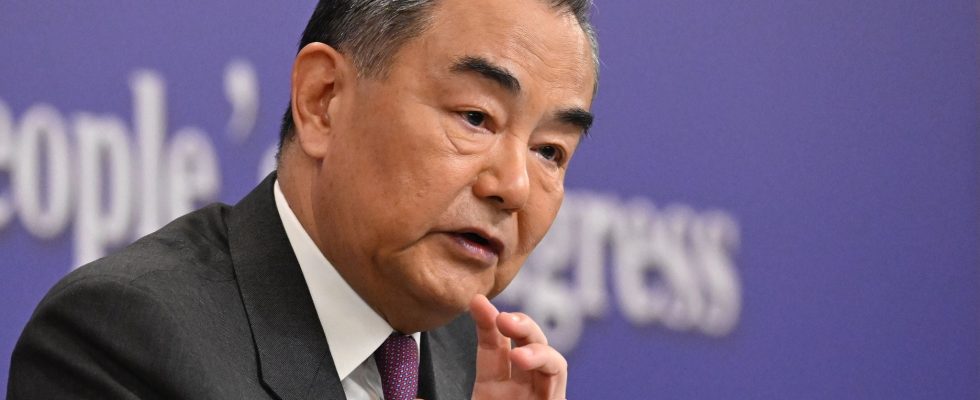His words are extremely scrutinized at a time of very strong geopolitical tensions. Chinese Foreign Minister Wang Yi denounced the behavior of the United States to the press on Thursday March 7 and praised the Beijing-Moscow partnership, also describing the humanitarian situation in Gaza as a “disgrace to civilization.”
The 70-year-old experienced diplomat castigated the multiple American attempts to exert “pressure” on Beijing and denounced “the desire to blame China under any pretext”, which “has reached an unimaginable level”. “The means of pressure on China are constantly renewed and the list of unilateral sanctions constantly lengthened,” lamented Wang Yi. “We resolutely oppose any hegemony and intimidation.”
Sino-American tensions are high on several issues: Taiwan, trade, rivalry in new technologies, the struggle for influence in the Asia-Pacific and even human rights. Wang Yi was speaking at the annual session of China’s Parliament.
Actions that ‘threaten peace’ in the South China Sea
His speech comes at a time when Beijing’s growing political influence is raising concerns among Westerners and some of its Asian neighbors. The leaders of Southeast Asian countries (Asean) and Australia warned on Wednesday against actions that “threaten peace” in the South China Sea, after new incidents between China and the Philippines in these disputed waters.
The Philippine coast guard accused their Chinese counterparts of causing collisions with two of their boats on Tuesday, on the sidelines of a resupply mission. Beijing judges that Manila deliberately wanted to provoke an incident. “On maritime disputes, China has always exercised great restraint,” Wang Yi said on Thursday. “But of course, we will not allow our goodwill to be abused” and “we will defend our legitimate rights” in the area, he said.
“Human tragedy”
China claims almost all of the islands in the South China Sea. Other riparian countries (Vietnam, Philippines, Malaysia, Brunei) have competing, sometimes overlapping, claims. While Washington regularly supports Manila, Wang Yi urged “certain countries outside the region not to cause trouble or not to take sides” and not to be “troublemakers” in this maritime area.
On Taiwan, he warned that the island’s leaders seeking independence for the territory, claimed by China and supported by the United States, will have to be held accountable to history. Wang Yi also rejected the idea that Beijing posed a threat to the world order.
“In the face of an unstable and complex international environment, China will resolutely be a force for peace, stability and progress in the world,” he stressed. Wang Yi thus reaffirmed Beijing’s support for the Palestinian cause and once again requested recognition by the UN of a full Palestinian state. “No excuse can justify the massacre of civilians,” he stressed while the conflict between Israel and Hamas still rages in the Gaza Strip.
“The fact that today, in the 21st century, this humanitarian catastrophe cannot be stopped is a human tragedy, even more, it is a shame for civilization,” he added, reiterating the call of his country has a ceasefire.
Tone conciliatory with the EU
Wang Yi also defended his country’s good relations with Russia on Thursday, while China is criticized by the West on the Ukrainian issue. If Beijing calls for respect for the territorial integrity of all countries – including Ukraine – it has never publicly condemned Moscow.
“China and Russia have created a new model for major power relations, which is completely different from the old Cold War era,” Wang Yi said. “On the basis of non-alignment, non-confrontation and non-targeting of third countries, we will continue on the path of permanent good-neighborly friendship and deepening our overall strategic cooperation” with Moscow, he pointed out.
Beijing seeks to position itself as a mediator and neutral party in the war, but its relationship with Moscow has deepened since the conflict began. On the European Union (EU), which displays growing distrust of China and describes it simultaneously as “a partner, a competitor and a systemic rival”, Wang Yi judged “this triple positioning is neither consistent with the reality nor viable in practice.
“It’s like a car is at an intersection and the red, yellow and green lights are all on. Which direction should you drive?” he asked. “There is no fundamental conflict of interest between China and Europe,” underlined Wang Yi, for whom “the common interests of the two parties far outweigh their differences”.
